Industry Profile: This article was published first in INFOFISH INTERNATIONAL issue 3-2024
Fishing is often seen as a male activity, especially regarding catch, vessel maintenance, equipment, and staying out at sea. However, the invaluable contributions of women in small-scale fisheries, processing facilities, and local markets cannot be overstated. In Cabo Verde, for example, the women sell the fish and know exactly what price she’ll get for a tuna. When she goes to the port and sees the fishers’ catch, she can instantly assess the quality of the fish, deciding which fish she wants to take and sell as opposed to what the fisher would like to sell.
Artisanal fisheries create jobs, providing 90% employment in the fisheries sector. They are essential as a source of income for many families and form social cohesion, the cohesion of coastal communities. One example of these types of fisheries is “one-by-one” fisheries, which are often closely associated with coastal communities in developing countries. They use pole-and-line, handline, or troll fishing techniques to catch one fish at a time. This fishing type is considered environmentally safe, socially responsible, and based on generations of tradition.
For these local fisheries and their communities, tuna fishing is more than just a job; it’s a way of life. Traditional, one-by-one fishing methods have been passed down through generations in many cultures. These fisheries’ cultural and traditional aspects keep fishers fishing and living locally for long periods, creating employment opportunities and food security and retaining wealth accumulation in the area that contributes to poverty alleviation.
As in other industries and professions worldwide, women are ubiquitous but underrepresented in leadership positions in fisheries and the maritime world: gender stereotypes still prevent women from working on board vessels and their contributions are often referred to as “hidden”. However, women are crucial throughout the fisheries value chain: In the ever-evolving landscape of the seafood industry, specific individuals stand out for their leadership skills and commitment to sustainability and ethical practices. Among these leaders are Suzanne Douglas, General Manager of Iconic Food Distributor Sirena Tuna; Sarah Eames, CEO of American Tuna; and Michelle Bellinger, CEO of ICV Africa. Let’s delve into their remarkable stories and the contributions they make to steer responsible tuna supply chains.
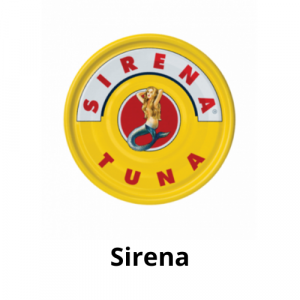
Sirena Tuna, under the stewardship of Suzanne Douglas, has a rich history dating back to its inception by Italian immigrant brothers in 1956. The brand’s commitment to producing high-quality products reminiscent of those from Europe has remained unwavering. Suzanne’s journey to Sirena was shaped by her upbringing in New Zealand, where she developed a deep appreciation for responsible management of natural resources. Her career path, spanning various FMCG businesses, equipped her with the skills and vision to lead an organisation dedicated to ethical sourcing and sustainability.
“For my next role, joining an organisation with a strong brand was important. There needed to be a commitment to great taste, great quality and ethically sourced food products. I was fortunate that the opportunity to join Sirena came up.”
Suzanne Douglas’ journey from the tranquil shores of Lake Wakatipu to the bustling world of seafood commerce is a testament to her commitment to responsible management practices. During her formative years fishing for trout, she instilled a deep respect for nature’s resources. From her tenure at Heinz to her current role at Sirena, Suzanne has remained steadfast in her dedication to ethical sourcing and quality assurance. Under her leadership, Sirena continues to thrive, offering consumers a range of responsibly sourced tuna products.
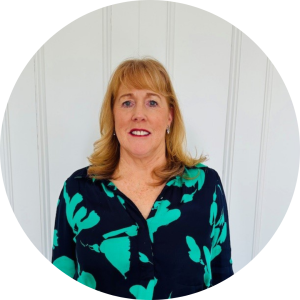 “Since those early days, the brand has gone from strength to strength. An essential part of this has been a commitment to buying 100% pole-and-line caught tuna and our International Pole and Line Foundation (IPNLF) membership to ensure we are doing the right thing. In the last few years, we have been focused on continuing to grow the Sirena brand; we have a range of tuna, which includes Oil and Springwater, as well as many flavours, the most popular of which is Chilli. We have also extended Sirena into Tuna and Chicken Ready Meals, which are selling very strongly. In 2023, we produced our first television advertisement for many years, shot in Europe. It focuses on a clear, quality message in a beautiful Mediterranean environment. Sirena is authentic, sophisticated, elegant, classy, stylish and timeless. We are an aspirational brand our consumers love, making us very proud to continue our Sirena journey.” — Suzanne Douglas.
“Since those early days, the brand has gone from strength to strength. An essential part of this has been a commitment to buying 100% pole-and-line caught tuna and our International Pole and Line Foundation (IPNLF) membership to ensure we are doing the right thing. In the last few years, we have been focused on continuing to grow the Sirena brand; we have a range of tuna, which includes Oil and Springwater, as well as many flavours, the most popular of which is Chilli. We have also extended Sirena into Tuna and Chicken Ready Meals, which are selling very strongly. In 2023, we produced our first television advertisement for many years, shot in Europe. It focuses on a clear, quality message in a beautiful Mediterranean environment. Sirena is authentic, sophisticated, elegant, classy, stylish and timeless. We are an aspirational brand our consumers love, making us very proud to continue our Sirena journey.” — Suzanne Douglas.
 Sarah Eames, CEO of American Tuna, embarked on a journey fuelled by a passion for sustainability and ethical trade. Joining the company in 2022, Sarah brought a fresh perspective and experience from her tenure at a leading retailer and an SME in the UK. Her transition to American Tuna represented a career move and a commitment to driving positive change in the seafood industry.
Sarah Eames, CEO of American Tuna, embarked on a journey fuelled by a passion for sustainability and ethical trade. Joining the company in 2022, Sarah brought a fresh perspective and experience from her tenure at a leading retailer and an SME in the UK. Her transition to American Tuna represented a career move and a commitment to driving positive change in the seafood industry.
American Tuna, Inc. was founded with the “American Tuna” brand and has grown to include a range of brands, including “Pole & Line”, in addition to supplying private label and food service products to leading US retailers and distributors. The mission of American Tuna is to provide high-quality, one-by-one harvested tuna products. All skipjack, yellowfin, and albacore tuna are 100% “one-by-one” and are caught by fisheries in the US, Maldives, and worldwide. The company’s focus on responsibly sourced tinned seafood products aligns with Sarah’s values, making her a driving force in promoting sustainable practices within the sector.
“American Tuna Inc. was founded on strong sustainability principles –initially focused on albacore caught by the Pacific Coast US fleet – and now sourcing from fisheries worldwide. We source only from one-by-one fisheries since we know this is the most responsible means for the ocean and coastal communities.”
Sarah Eames’ decision to join American Tuna marked a pivotal moment in her career. With a background in food science and a passion for sustainability, Sarah embraced the challenge of leading in a new position in a new market to promote responsible seafood sourcing. Starting her career at Sainsbury’s, one of the leading retailers in the UK, she became quickly aware of the complexity of food supply chains. At World Wise Foods, she had the opportunity to delve into the world of seafood and develop as a leader. Taking on responsibility for food safety, product development and sustainable sourcing, Sarah travelled the globe to work hand in hand with suppliers and customers across Asia, Europe, Africa and North America. As CEO of American Tuna, Sarah is at the forefront of driving positive change, one tin of responsibly sourced tuna at a time.
“I think my career path and experience have been unique – over just a 15-year career, I’ve worked in retail and the supply base, in large and small businesses, and gained supply chain experience worldwide. I’ve seen the local impact of our fisheries first-hand and even caught a few tuna by pole-and-line myself!
I’ve moved from the UK to the US, from a specialist technical role to the broadest leadership position. This has taken hard work and tenacity, but I have also experienced unwavering support from passionate leaders and mentors. This support, engagement, and welcoming of young people, particularly young women, within and into the seafood industry will transform it. The seafood world is scientific, political, and commercial; male-dominated at a leadership level; and can be intimidating. Despite this, I know there is opportunity here for women. I hope my experience can inspire leaders to provide encouragement, trust, and support and assure those looking to join or lacking support in this industry – an alternative exists. By providing trust and opportunity to young female leaders of tomorrow, we can pave the way for a more welcoming, responsible, and equitable seafood sector.” — Sarah Eames
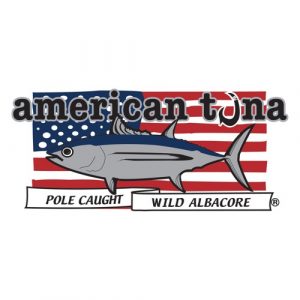

Michelle Bellinger’s ascent to the helm of ICV Africa exemplifies resilience and dedication. Starting as a Financial Manager in 2011, Michelle seized the opportunity to lead the company towards a sustainable future. ICV Africa’s emphasis on pole-and-line fishing and partnerships with stakeholders across the supply chain reflect Michelle’s unwavering commitment to ethical and environmentally conscious practices. Her efforts in promoting traceability and market demand for sustainable seafood have positioned ICV Africa as a beacon of responsible fisheries management.
Currently, ICV Africa is one of the largest companies in South Africa for tuna trading, building long-term relationships with suppliers and buyers along the way. Most remarkably, ICV Africa is an all-women-managed company with a mission of contributing to recognising the value of women in driving change in the fishing industry, making it a true leader in women’s empowerment.
“We are a proud and tight-knit team, and we should always keep the importance of women’s roles and continue to play in fishing communities worldwide in mind. Efforts to promote gender equality and inclusivity in the fishing industry are essential for sustainable fisheries management and the well-being of fishing communities. It’s absolutely possible while also driving a successful business.”
Michelle’s ascent to leadership at ICV Africa underscores her unwavering commitment to sustainable fisheries management. Despite the challenges posed by a male-dominated industry, Michelle has emerged as a trailblazer, forging partnerships and driving innovation. Her dedication to pole-and-line fishing and supply chain traceability reflects her deep-rooted belief in ethical sourcing practices.
Where others might be fearful of ‘opening their books’, Michelle has pledged 100% open transparency throughout ICV’s supply chain, following the journey from fishing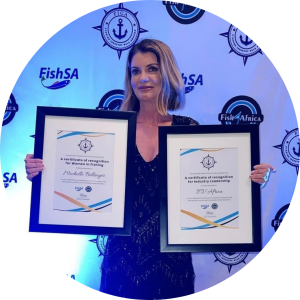 vessels to respective canneries to brand owners. Through her leadership, ICV Africa is not just a company; it’s a catalyst for change in South Africa’s seafood industry.
vessels to respective canneries to brand owners. Through her leadership, ICV Africa is not just a company; it’s a catalyst for change in South Africa’s seafood industry.
“When I first entered the seafood industry, I had no idea how much it would take over my life. The community, the drive for sustainability and traceability, the passion for the ocean and the tuna we catch, and most of all, the beautiful South Africa we call Home. On this journey, we have forged great partnerships with fishers, technology providers, traders, buyers and even at the governing body level, where my passion for sustainable fishery development can thrive. As a woman in a male-dominated industry, the path has been challenging but so rewarding. The platform it has given me to bring awareness to sustainable fisheries has been unrivalled” — Michelle Bellinger.
Within the seafood business community, the female-to-male ratio becomes smaller when climbing the ladder closer to the C-level. Despite the traditional norms in the international and commercial seafood sector, women like Suzanne, Sarah, and Michelle are passionately and enthusiastically breaking barriers. They gracefully navigate a male-dominated industry, leveraging their expertise to source responsibly and support small-scale fisheries. Their leadership drives business success and fosters a culture of sustainability and inclusivity within their organisations.
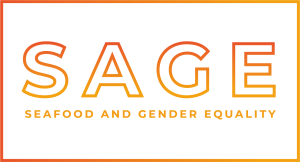 Seafood and Gender Equality (SAGE) promotes gender equality in the global seafood sector, leading to a more resilient industry, thriving communities, and abundant resources for future generations. SAGE Founder Julie Kuchepatov is hopeful for a bright future for women and other historically excluded people in the fishing industry. Excluding women and others from decision-making spaces, at best, ignores the incredible skills and knowledge that they bring to the table; at worst, it leads to the creation and implementation of policies and legislation that can be harmful. Women are the backbone of the fishing industry and are incrementally gaining more and more access to decision-making spaces; however, where the present and future of our planet’s most precious resource – fish and seafood – are determined, there is still a long way to go.
Seafood and Gender Equality (SAGE) promotes gender equality in the global seafood sector, leading to a more resilient industry, thriving communities, and abundant resources for future generations. SAGE Founder Julie Kuchepatov is hopeful for a bright future for women and other historically excluded people in the fishing industry. Excluding women and others from decision-making spaces, at best, ignores the incredible skills and knowledge that they bring to the table; at worst, it leads to the creation and implementation of policies and legislation that can be harmful. Women are the backbone of the fishing industry and are incrementally gaining more and more access to decision-making spaces; however, where the present and future of our planet’s most precious resource – fish and seafood – are determined, there is still a long way to go.
To solve challenges like illegal harvest, the impacts of climate change, and forced labour in seafood supply chains – we need all hands on deck. It will take innovation and diverse voices together pushing forth solutions to solve these critical challenges. Moreover, research has shown that women leaders “greenwash” less, so with more women in leadership positions, we will not only gain a more realistic picture of how companies in the seafood sector are addressing these challenges but more innovative solutions to address them will become available.
We must remember that men also are constrained by gender norms and traditions in their communities. In small-scale fisheries under environmental duress, this can mean that the men who fish might have to fish longer and go further out at sea, potentially putting their lives at risk. Looking at global fisheries and the seafood sector through a gender lens allows us to examine the challenges facing coastal fishing communities in a holistic way that considers people of all genders and develops appropriate solutions.
“When women lead, communities thrive, the ocean breathes, and the planet recharges.”
— Julie Kuchepatov —
Founder, Seafood and Gender Equality (SAGE)
In seafood sustainability, the impact of these female leaders can’t be overlooked; Suzanne, Sarah, and Michelle exemplify the transformative power of passion, dedication, and resilience. We see more and more women thriving in the seafood business world with their natural tendencies and authentic voices. Their stories inspire future generations of leaders, male and female, demonstrating that gender is no barrier to success in the pursuit of responsible tuna supply chains.
Small-scale fisheries are often located in small-island developing states (SIDs) or coastal states where the threat of climate change is real and where the livelihoods of coastal communities are intrinsically linked to the ocean. However, they’re threatened by large industrial fisheries with which they have to compete for scarce resources and are not always provided with equal opportunities to compete fairly in the marketplace. Companies that recognise their procurement practices can remove barriers to market access for small-scale fisheries and safeguard fishers’ livelihoods. They directly invest in local supply chains that benefit coastal communities by including small-scale fishery sourcing requirements and establishing long-term business partnerships with these fisheries.
American Tuna, ICV Africa, and Sirena Tuna are creating real opportunities and showing concrete action in supporting global one-by-one tuna fisheries and their sustainability. As we celebrate their achievements, let us continue to support and empower women in seafood, ensuring a more equitable and sustainable future for all.